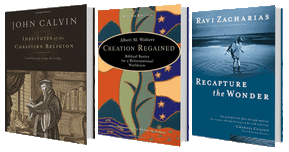
The metaphor that has worked for me is one used by Al Wolters in his reformation theology primer Creation Regained: Biblical Basics for a Reformational Worldview. His metaphor for Scripture is two-fold: that of spectacles, and a miner’s lamp. He actually uses more, but these two are my favourite. In the former, he claims that “The Scriptures teach us to look for God’s norms in our experience and also serve to greatly improve our vision” (Wolters, p. 37). Spectacles, of course, improve vision and here he borrows from John Calvin who described this metaphor in his Institutes of the Christian Religion:
"Just as old bleary-eyed men and those with weak vision, if you thrust before them a beautiful volume, even if they recognize it to be some sort of writing, yet can scarcely construe two words, but with the aid of spectacles will begin to read distinctly; so Scripture, gathering up the otherwise confused knowledge of God in our minds, having dispersed our dullness, clearly shows us the true God" (Calvin’s Institutes of the Christian Religion, 1.6.1).
Scripture-spectacles help us to think of the Scriptures not simply as God’s love letter to us or as a map, but as a means to improve our God-vision. The Scriptures, in this view, are meant to clarify the world around us according to God’s intention. Wolters continues by claiming that the Scriptures can also be thought of as a miner’s lamp which “lights up the world wherever we turn to look at it” (p. 18). It is important, Wolters reminds us, that the miner is not gazing at the lamp, but rather that the dark rock face is illuminated in whatever direction that the miner’s lamp is facing – in whatever direction the miner is looking. Scripture then, improves our vision and illuminates the things of God in an otherwise unclear and poorly lit environment.
I was reminded anew of this metaphor as I was reading Ravi Zacharias’ Recapture the Wonder. In it he warns about the danger of looking at the Bible, instead of looking through the Bible:
“There is a world of difference between looking at something and looking through something. We make the same colossal mistake with God’s Word and the gift of print. We have books all around us. We stack them on our shelves. Yet He has revealed Himself in His Word and we let it lie unstudied, unread, and sometimes untouched. We look at it. We hardly ever look through it” (Zacharias, p. 146).
God’s Word is at its best when it is allowed to illuminate the darkness and clarify our vision. How does this play out in our day-to-day, routine lives? How does it affect how we do our work? Does it change how we learn, how we teach? If we’re not looking through Scripture as opposed to looking at Scripture, we’re destined to miss a great deal of what God intended us to know. It is imperative to living a Godly life that we allow God to speak to us through His Scripture, and that his voice changes the way we see the world around us.
Calvin, J. (1957). Institutes of the Christian religion. Grand Rapids, MI: Eerdmans.
Wolters, A. M. (1985). Creation regained: biblical basics for a Reformational worldview. Grand Rapids, Mich.: W.B. Eerdmans Pub. Co..
Zacharias, R. K. (2003). Recapture the wonder. Nashville: Integrity Publishers.

 RSS Feed
RSS Feed
